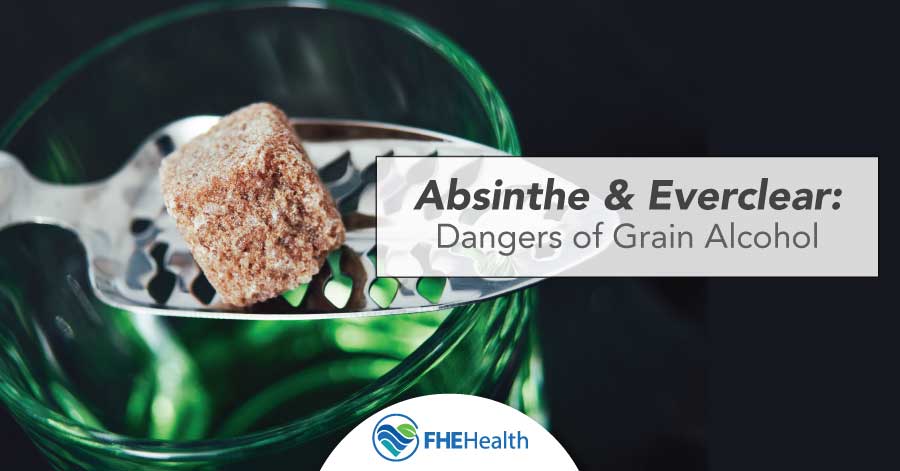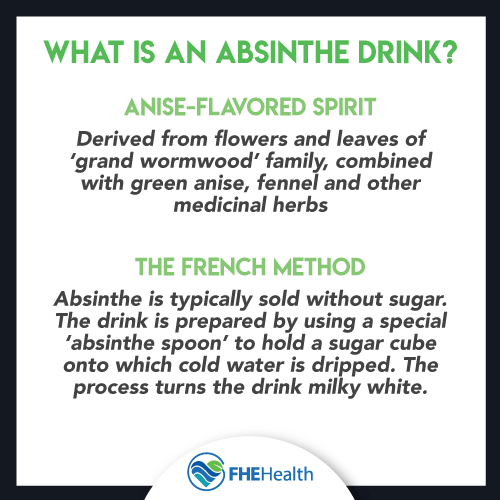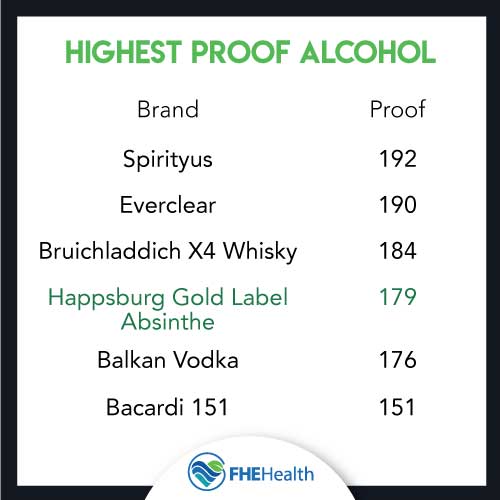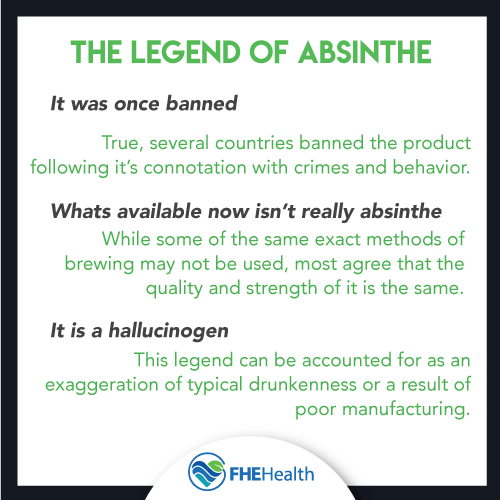
Absinthe and Everclear are high-proof alcohols. It’s important to understand what high-proof alcohol is, why it is potentially bad for you and what steps you should take if you’ve consumed it.
There’s some evidence, according to Scientific American, that Vincent van Gogh had an addiction to absinthe. It’s believed that his use of the product along with his existing psychosis led him to commit suicide. Is absinthe that powerful?
What is Absinthe?
Absinthe is what some might call pure grain alcohol with a high proof, or alcohol, content. Some products are 200 proof alcohol. They may cause hallucinations in some people while creating a high level of euphoria in others. Absinthe has been around for over 200 years, though it has more modern marketing associated with it. In the United States, absinthe was illegal for almost 100 years, although it is now legal again.
What Makes Absinthe So Powerful?
 Absinthe is a unique drink produced from distilled grains and green anise along with herbs such as wormwood oil and fennel. Various types exist, including those that have an alcohol concentration of 45 percent (90 proof). Other products claim to have an even higher proof.
Absinthe is a unique drink produced from distilled grains and green anise along with herbs such as wormwood oil and fennel. Various types exist, including those that have an alcohol concentration of 45 percent (90 proof). Other products claim to have an even higher proof.
Absinthe tastes like black licorice and has an herbal, floral aroma. Its primary flavor profile is that of anise, with a mild bitterness that tastes good to many people.
The process of making absinthe is also a key component to what makes it unique and powerful. Traditionally, the manufacturer soaked wormwood along with a mixture of spices in alcohol. Wormwood, which is a type of plant that contains thujone, is key.
This component is an essential ingredient in the production of the high potency of this drink. The mixture is distilled, which develops the flavor and allows the thujone to infuse.
The distillation also causes the herbal oils and alcohol to evaporate, pulling the water and the bitter elements away from the final product. It is then recondensed in a cooling area, before being diluted to the proper strength.
What Is High-Proof Alcohol?
By definition, alcohol like the absinthe drink is high-proof because it has a high concentration of alcohol. Alcohol proof is twice the percentage of alcohol by volume.
One example of a brand with a high proof is Everclear. Often called 151 or 190, this is high-concentration grain alcohol produced by Luxco. At 190 proof, it contains up to 95 percent alcohol.
The Historical Elements of Absinthe Drink
 What makes absinthe of specific interest is that it was banned. It was first produced in Switzerland around 1792. During those early years, it developed a strong following throughout Europe, especially in France.
What makes absinthe of specific interest is that it was banned. It was first produced in Switzerland around 1792. During those early years, it developed a strong following throughout Europe, especially in France.
It didn’t make it to the United States until 1878. The alcohol was heavily sought after by those who consumed it, and it flourished globally.
It wasn’t until the turn of the 20th century that claims of its risks began to occur. In France, specifically, the era of peace and progress just before World War I had many people pushing against this type of alcohol.
They sought to label it a dangerous product. Countries including the Netherlands, Brazil, Belgium and Switzerland banned the drink. In 1912, the United States did the same.
The loss of appeal of the drink occurred due to a cultural shift, but also because of stories about the use of the drink and illicit behavior. For example, a man drinking it killed his family, and a laborer got so drunk, it caused him to go insane.
What Are the Impacts?
Absinthe has a high alcohol content, which means it can cause intoxication quickly. Some people still believe it can cause a person to go mad, though this is unlikely. Rather, a study by Columbia University found that thujone, a natural substance found in absinthe, can cause reaction times to slow significantly, making it very difficult to pay attention.
It is possible that auditory and visual hallucinations can occur. Some of the research indicates that wormwood, an ingredient in some forms of absinthe, may be the cause of these effects.
Any highly potent alcohol can cause intoxication and chemical dependency, which makes it a high-risk drink for many people. Addiction can form from its use and overuse.
What Are the Short-Term Dangers?
The use of this drink can cause some initial dangers to a person’s health. These are much like any other type of alcohol:
- Loss of motor control
- Difficulty concentrating
- Risks of making poor decisions
- Inability to control bodily functions
- Hallucinations
There is also some risk of more severe outcomes. In some people, it can create a risk of developing epilepsy, psychiatric health problems or brain damage. There is some evidence that it can increase the risk of suicide in those who suffer from depression.
What Are Long-Term Dangers?
Chronic use of this or other alcohols can lead to a significant amount of damage to the body. In some instances, it can lead to conditions such as cirrhosis of the liver, kidney failure and alcohol-related cardiomyopathy.
In some people, diabetes can develop. In others, brain damage can occur, especially in those who often drink a significant amount of high-proof alcohol.
What Myths Surround Its Use?
 It’s possible to develop an addiction to absinthe, but this can be true about any type of alcohol. In the United States, absinthe was illegal from 1912 through 2007, but currently, it is possible to purchase and consume it. However, new products do not contain thujone, the substance many believe caused hallucinations.
It’s possible to develop an addiction to absinthe, but this can be true about any type of alcohol. In the United States, absinthe was illegal from 1912 through 2007, but currently, it is possible to purchase and consume it. However, new products do not contain thujone, the substance many believe caused hallucinations.
The biggest misconception about absinthe is that it can cause a person to become manic and have delusions. This is not likely to be the case.
Most often, the highest risk comes from alcohol addiction in long-term use. However, anyone can have an allergic response to a product like this, leading to more complex and severe outcomes.
In short, as with all types of alcohol, absinthe can be very dangerous. Yet, the level of risk may have been misunderstood in the 1900s.
Treatment for Absinthe Addiction
Individuals with an addiction to absinthe or other alcohol should seek treatment, which may include detox for those who have a chronic condition. However, the treatment for this type of alcohol addiction is much like that of any other.
Because chemical dependency can occur, detox tends to be a requirement. From there, therapists can design a treatment plan to manage the underlying cause of the addiction, such as any existing mental health disorder.
Intensive inpatient or outpatient care is necessary. Treatment options such as cognitive behavioral therapy can help patients as well.
Seeking Help for Alcohol Addiction at FHE Health
If you or a loved one has an addiction to alcohol of any type, seek help from our trained, compassionate representatives. You can call us at (833) 596-3502 at any time to speak to our admissions team about the treatment options we offer.






